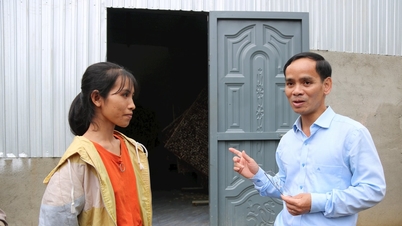DNVN - In the context of continuously increasing real estate prices, the Vietnam Association of Realtors (VARS) has proposed solutions to control the market through credit policies, to prevent speculation and ensure long-term stability for the economy .
According to the 2023 Law on Real Estate Business, measures to regulate the real estate market will be implemented when the transaction price index fluctuates by more than 20% within 3 months, or when the market has other fluctuations that threaten socio-economic stability. However, VARS believes that this is difficult to implement because the current database system is not complete and accurate enough.
VARS believes that regulating the market through credit policies is an effective solution to ensure sustainable and stable development, while preventing negative impacts on the economy.

First, VARS proposes to tighten credit for real estate speculators. Specifically, to minimize speculative borrowing or excessive financial leverage, credit institutions can reduce lending limits by adjusting loan-to-value ratios, requiring higher equity ratios, or applying higher interest rates to buyers of two or more properties.
In addition, VARS proposed to strengthen credit monitoring and management. The government can apply credit quality control regulations, requiring banks to report more details on real estate-related loans, thereby improving the ability to monitor risks.
In addition, the State needs to establish a priority credit mechanism for social housing projects, support the development of social housing and affordable housing to meet the housing needs of low-income people.
VARS also recommends a credit easing policy for first-time homebuyers or other priority groups. Specifically, reducing interest rates and supporting long-term loans with preferential interest rates for newly married young couples will help stabilize the market and society.
"In order for policies to be implemented properly, the State needs to build a database system that is large enough, accurate enough, and updated regularly, to clearly distinguish between real home buyers and profiteering speculators," VARS emphasized.
VARS also recommends combining credit policy with tax measures, such as real estate transfer tax or property tax, for more comprehensive market regulation. However, it is necessary to ensure that these policies are applied flexibly to stabilize market order and limit risks.
Associate Professor Dr. Dinh Trong Thinh - an economic expert, also agrees with the view that regulating the market through credit policies will help management agencies strengthen their control role in the context of strong fluctuations in real estate. Over the past decade, the situation of some groups of speculators and brokers "inflating prices and creating waves" has become common. At the same time, lax management has caused real estate prices in many areas to fluctuate strongly, causing consequences.
Regulating the real estate market through credit policy is not new. Many countries have applied it successfully.
In the US, after the 2008 financial crisis, the US Federal Reserve (Fed) lowered interest rates to stimulate the economy and demand for housing, while applying strict credit standards to prevent risks from subprime mortgages. The US government also has credit support programs for first-time homebuyers, such as the FHA program with low down payments and preferential interest rates.
In Canada, the government has tightened loan-to-value rules to limit risky lending. Homebuyers in major cities like Toronto and Vancouver are required to make higher down payments when borrowing to buy real estate.
Many other countries, such as Australia and Canada, have also applied credit controls on foreign property buyers, to prevent speculation and protect middle-income people.
"The policies that countries have successfully applied can absolutely become valuable lessons for Vietnam," VARS commented.
In recent times, real estate prices in Vietnam have increased rapidly, showing signs of speculation and profiteering. In a report sent to the Government Office, the Ministry of Construction assessed that real estate speculation is the cause of the high price of commercial housing in some urban areas. The Ministry has proposed many solutions to control the market, including taxing second real estate and abandoned properties. The Ministry of Finance agreed and said it would study and implement this solution.
An Nhien
Source: https://doanhnghiepvn.vn/kinh-te/de-xuat-siet-tin-dung-voi-nguoi-so-huu-nhieu-bat-dong-san/20240928034031836



![[Photo] Prime Minister Pham Minh Chinh meets with representatives of outstanding teachers](https://vphoto.vietnam.vn/thumb/1200x675/vietnam/resource/IMAGE/2025/11/15/1763215934276_dsc-0578-jpg.webp)


![[Photo] General Secretary To Lam receives Vice President of Luxshare-ICT Group (China)](https://vphoto.vietnam.vn/thumb/1200x675/vietnam/resource/IMAGE/2025/11/15/1763211137119_a1-bnd-7809-8939-jpg.webp)








































































































Comment (0)